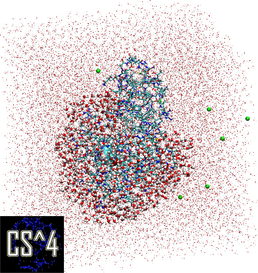Seminar 11th February 2011 3:30 p.m. University of Southampton, Building 37, Room 4127
Biomolecular studies from linear-scaling density functional theory calculations with thousands of atoms
Dr Chris-Kriton Skylaris
University of Southampton
- Web page
- http://www.southampton.ac.uk/chemistry/about/staff/cks.page?
- Categories
- AMBER, Bioinformatics, Biomolecular Organisation, Biomolecular simulations, Complex Systems, Computer Science, Density functional Theory, FFT, Fortran, HECToR, HPC, Iridis, Materials, Molecular Dynamics, MPI, Multi-physics, Multi-scale, Nanoscale Assemblies, Onetep, Scientific Computing, Software Engineering, Structural biology
- Submitter
- Chris-Kriton Skylaris
Complex Systems Simulation Seminar Series (CS^4)
from the Institute for Complex Systems Simulation, the Complexity in Real-World Contexts USRG, the Computational Modelling Group and the Computational Systems Chemistry section (School of Chemistry).
Abstract
The reformulation of Kohn-Sham Density Functional Theory (DFT) in terms of the one-particle density matrix provides a route for constructing approaches where the computational cost increases only linearly with the number of atoms [1], in materials with a band gap.
The ONETEP [2] program that we develop belongs to a class of linear-scaling DFT approaches which are designed to work with a large basis set which is similar [3] or even equivalent [4] to a plane wave basis set and can be systematically improved towards near-complete basis set accuracy [5].
Another advantage of our approach is the lack of Basis Set Superposition Error (BSSE) [6].
I will provide examples showing how ONETEP can perform calculations on many thousands of atoms, on hundreds of computational cores [7].
From the various recent and ongoing developments which extend the functionality of the code I will focus on approaches intended mainly for bimolecular simulations such as implicit solvation models [8], electrostatic embedding, and dispersion energy contributions [9].
I will conclude with an overview of applications of the code to biomolecular simulations involving protein-protein [10] and protein-ligand interactions in which the entire proteins are treated quantum mechanically thus taking into account the important effects of electronic charge transfer and polarisation [11].
References
[1] S. Goedecker. Rev. Mod. Phys., 71, 1085 (1999).
[2] C.-K. Skylaris, P. D. Haynes, A. A. Mostofi and M. C. Payne. J. Chem. Phys. 122, 084119 (2005).
[3] J.-L. Fattebert and J. Bernholc. Phys. Rev. B 62, 1713 (2000); M. J. Gillan, D. R. Bowler, A. S. Torralba and T. Miyazaki, Comput. Phys. Commun. 177, 14, (2007).
[4] A. A. Mostofi, P. D. Haynes, C.-K. Skylaris and M. C. Payne. J. Chem. Phys. 119, 8842 (2003).
[5] C.-K. Skylaris and P. D. Haynes. J. Chem. Phys. 127, 164712 (2007).
[6] P. D. Haynes, C.- K. Skylaris, A. A. Mostofi and M. C. Payne. Chem. Phys. Lett. 422, 345 (2006).
[7] C.-K. Skylaris, P. D. Haynes, A. A. Mostofi and M. C. Payne. Phys. Stat. Sol. (b). 243, 973 (2006); N. D. M. Hine, P. D. Haynes, A. A. Mostofi, C.-K. Skylaris and M. C. Payne. Comput. Phys. Comm. 180, 1041 (2009).
[8] D. A. Scherlis, J.-L. Fattebert, F. Gygi, M. Cococcioni and N. Marzari. J. Chem. Phys. 124, 074103 (2006).
[9] Q. Hill and C.-K. Skylaris. Proc. R. Soc. A 465, 669 (2009).
[10] D. J. Cole, C.-K. Skylaris, E. Rajendra, A. R. Venkitaraman and M. C. Payne. Europhysics Letters 91, 37004 (2010).
[11] R. Lonsdale, K. E. Ranaghan and A. J. Mulholland, Chem. Commun. 46, 2354 (2010).
Refreshments
Available from 3:30pm, lecture starts at 4pm.
Complex Systems Simulation Seminar Series
For the complete CS^4 schedule please click here: http://www.multidisciplinary.soton.ac.uk/cs4.html
Contact
Multidisciplinary Research Co-ordinator
University Strategic Research Groups
Research and Innovation Services
02380 593244
